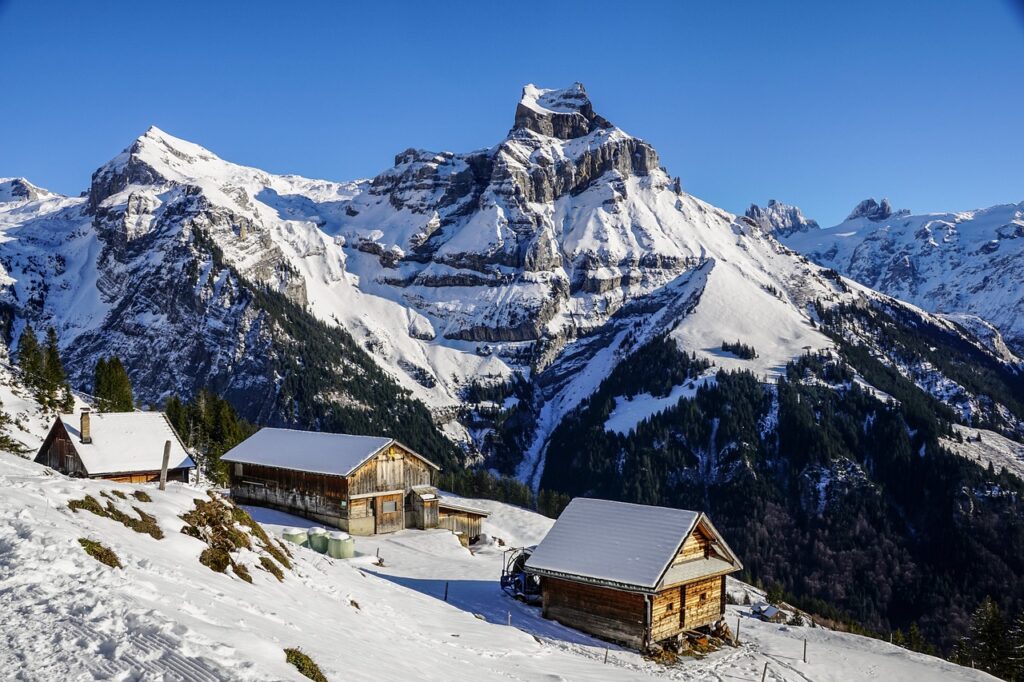If you have been to the Alps, you know it’s an unparalleled haven for skiers, hikers, and nature enthusiasts. Boasting majestic mountains, crisp air, and breathtaking views, being there made me feel like I was on a retreat. I went to the Dolomites but only for a few hours. This time I am planning on taking a longer trip there in winter. Before packing our skis and embarking on this incredible adventure, I have started considering how my travel could affect the environment. Me being environmentally friendly doesn’t just protect the planet, I find it enriching my experience too. So here are a few tips I have collected that will ensure our winter trip stays as green as possible.

Select Eco-Friendly Accommodation
Opting for Eco-Certified Lodges
In summer, I stayed at a local Italian family owned hotel that served organic food. Selecting eco-certified lodges is an effective way to reduce your environmental impact while making the most of your Alpine stay. These accommodations have been independently verified for their sustainable practices, such as energy efficiency, waste reduction, and using renewable resources. When looking for sustainable accommodations, look for lodges certified by organizations like Green Key, European Ecolabel, or EarthCheck. Certified establishments demonstrate their adherence to high standards of environmental stewardship. Environmentally conscious lodges offer special experiences such as organic meals sourced from nearby farms, nature conservation programs, and educational tours that highlight the significance of alpine ecosystem preservation. By choosing eco-certified lodgings, not only are you supporting sustainable businesses, but you’re also deepening your connection to their breathtaking surroundings.
Support Local and Family-Run Businesses
Contributing to local family-run businesses while on your visit is an effective way of making sure that your trip leaves a positive mark in the community. Sustainable practices and locally sourced materials and ingredients can reduce carbon emissions associated with transport. By opting for family-run restaurants or buying souvenirs directly from local artisans, you are directly contributing to their economies while helping preserve cultural traditions. Furthermore, these businesses often provide personalized and authentic experiences you won’t find in larger operations. By engaging with the local community this way, not only do you enjoy more memorable trips, but you also foster economic resilience and sustainability within the region.
Pack Appropriate Thermal Clothes
My winters in Europe taught me how to be warm. I used to take a few trips to the mountain which taught me the art of layering up. When traveling to alpine regions, packing appropriate thermal clothing is key to having an enjoyable and fulfilling experience. As temperatures in these areas can fluctuate quickly in the evenings, having warm clothes on hand is necessary to remain comfortable. Layering is key. Start with a moisture-wicking base layer to keep sweat away from your skin, followed by an insulating middle layer such as fleece or a down jacket to retain body heat. An outer windproof and waterproof layer should then protect you from the elements. Thermal accessories such as gloves, thermal hats for women, and socks are essential to staying warm when exploring alpine scenery without discomfort and will allow you to fully experience all that these regions have to offer.
Sustainable Transport Options.
Take the Train, Not the Plane
Traveling by train is one of the best ways to reduce carbon emissions while discovering new destinations. Trains typically emit far fewer greenhouse gasses per passenger mile compared to airplanes, making them a more eco-friendly option. Train travel can provide a more relaxing and scenic journey, allowing you to appreciate the passing landscapes as part of your travel experience. I use Rail networks in many regions because they are extensive and well-connected, providing convenient and relaxing rides to various destinations. Traveling by train also saves time and hassle associated with airport security checks and long boarding procedures. Plus, you get to contribute towards creating a more sustainable world while enjoying more relaxing and visually rewarding transportation.
Use Public Transport or Bike Rentals
Another great way to reduce environmental impact while traveling is using public transportation or bike rentals. Most cities and towns provide reliable public transport systems such as buses, trams, and subways that emit far fewer emissions per passenger than private cars. By choosing one of these modes of travel, not only can you reduce your carbon footprint but also avoid parking hassles and rental car fees. Bike rentals provide an eco-friendly option to get around quickly. Many urban areas have adopted bike-sharing programs, making renting bicycles simple and affordable. Cycling not only reduces pollution and traffic congestion but also allows you to explore your surroundings at your own pace, uncovering hidden gems or scenic routes you might otherwise miss using other modes of transport.
Mindful Outdoor activities
Guided Nature Tours Offer a Unique Experience
Guided nature tours can transform your outdoor experience, providing insights and stories you might otherwise miss. Led by knowledgeable local guides, these excursions combine education and adventure for an unparalleled outdoor adventure. Exploring forests, rugged mountain trails, or tranquil coastal areas requires special knowledge and insights about local flora and fauna, as well as geological formations and their cultural and historical significance. Something only an experienced tour guide can do effectively. Some nature tours add an exciting, memorable and educational component with activities like bird-watching, photography workshops or tasting local wild foods. By providing guided expertise and interactive components that create memorable and entertaining tours, nature tours become even more informative and exciting.
Take Up Low-Impact Sports
Engage in activities with minimal environmental impacts. Snowshoeing, cross-country skiing and gentle hikes can provide enjoyable outdoor experiences without contributing to soil erosion or wildlife disturbances.
Reduce Waste
Cut Down on Single-Use Plastics
Bring along a reusable water bottle, a travel mug, and a coffee mug. Most Alpine villages offer refill stations, so it is easy to stay hydrated without creating extra waste. Don’t forget to pack reusable shopping bags and containers when packing for a picnic.
Thanks for reading. Any tips for this trip? You can also read How To have a stress-free travel experience
